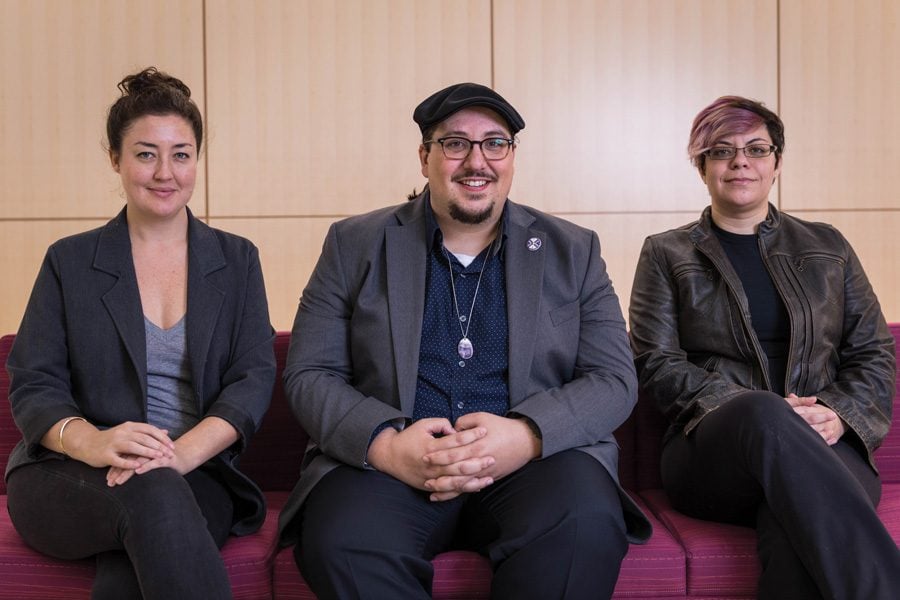Big Ten professors discuss supporting Indigenous communities, advancing Native American studies
History Prof. Doug Kiel (middle) represented Northwestern on the panel Monday. He is one of only six full-time Native American faculty and staff at NU.
October 13, 2020
To commemorate Indigenous Peoples’ Day, Native American studies professors and practitioners from nine Big Ten schools gathered to discuss advocacy and allyship in higher education in a Monday panel.
At the panel, hosted by the Big Ten Native Alliance, participants discussed their universities’ Indigenous communities, outreach programs and research initiatives. The nine professors and researchers featured in the panel were all members of Native American tribes.
Aaron Golding, assistant director of Multicultural Student Affairs, opened the event by reading a land acknowledgement listing all the tribes whose land the Big Ten universities occupy.
“Let us build and strengthen relationships with the peoples on whose land we reside,” Golding said.
History Prof. Doug Kiel, who represented NU on the panel, said the University’s Indigenous community is “quite small.” He said there are six full-time faculty, at least five staff members and about 100 to 200 undergraduates who self-identify as Native American — less than 2 percent of the student population.
But these self-reported numbers are unreliable, Kiel said in an email to The Daily. Some people make claims to Indigenous ancestry without possessing tribal membership or kinship, which inflates those percentages, he said.
A better metric might be considering the number of students active in the campus Native American community: about seven undergraduates, Kiel said.
Kiel said NU has a complicated relationship with the Cheyenne and Arapaho tribes because of NU founder John Evans’ involvement in the Sand Creek Massacre.
In March, Board of Trustees chairman J. Landis Martin said the Board would not reconsider its decision to keep John Evans’ name on the Alumni Center or other campus spaces. He added that the trustees felt Evans’ conduct didn’t “rise to the level” of removing his name from any buildings and was, in fact, “exemplary.”
“John Evans was very vocally anti-Indigenous — well, not according to some people on our Board of Trustees, ” Kiel said. “All of this work that’s taking place on Northwestern’s campus is driven by an effort to establish some sort of better and meaningful relationship with (Native) people.”
NU holds an annual commemoration of the Sand Creek Massacre, Kiel said, but in past years, the attendees have largely been members of the Indigenous community on campus.
The low non-Native attendance rate is disappointing to see, he said, because in many ways the events are geared toward promoting awareness of NU’s history among its non-Native population. In his undergraduate courses, he makes an effort to fill in the “tremendous inadequacies” present in traditional K–12 American government education, Kiel said.
“Students learn about government in terms of the legislative, federal, local and state governments, and they don’t learn anything about tribal government or Native law,” he said. “I think it’s an important act of citizenship for not just Native students, but non-Native students to sit in on classes like that and make themselves aware of what’s happening in the world around them.”
Raising awareness of Native experiences on campus helps shape the national social climate, University of Michigan Prof. Bethany Hughes said.
While most of the students in her Introduction to Native American Studies course will not pursue Native studies, Hughes said, they will still exit the class knowing more about Native issues and history than the vast majority of the American population.
“I teach them in hopes that when they are on the PTA board, they can be the voice to discuss whether dressing up like Indians for the preschool Thanksgiving play is really the best option,” Hughes said. “Native people need allies.”
Correction: This story has been updated to accurately reflect the number of faculty and staff members at Northwestern who self-identify as Native American.
Email: maiapandey@u.northwestern.edu
Twitter: @maiapandey
Related Stories:
— Defining Safe: The Path to a Minor in Native American and Indigenous Studies
— Scholar donates collection of American Indian and Indigenous books and texts to NU
— Center for Native American and Indigenous Research connects through virtual open houses



